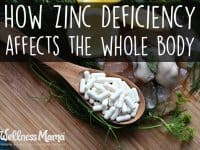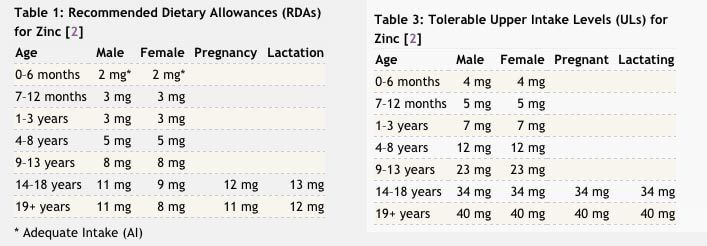

I find it ironic that I had a zinc deficiency for years without realizing it… especially because I’d written a senior biology paper on the functions of zinc in human biology.
Like magnesium, I knew the many ways that zinc functions within the body, but I assumed I was obtaining enough from food. Many processed foods are fortified with zinc, and it also occurs naturally in foods like oysters, beef, chicken, pumpkin seeds, lamb, spinach and yogurt.
The Role of Zinc In the Body
Zinc is a master-mineral of sorts (along with magnesium), and is needed for many reactions within the body. Unlike fat soluble vitamins, zinc is not stored for long periods of time in the body, so we need a constant supply of quality zinc from diet.
We don’t need large amounts of zinc each day, but it is absolutely vital that we get enough. Zinc is technically an essential trace element that is important for:
- Proper immune function
- Skin health and hair growth
- Metabolism of food and absorption of other nutrients
- Hormone balance
- Gut health
- Mental clarity
- Wound healing
- DNA synthesis
- For eye health
- Proper cell division (one of the reasons it is vital during pregnancy)
- Even adequate taste and smell
We know that zinc is involved in thousands of reactions within the body and recent reserach is even showing that zinc might be vital in protecting the body against various types of cancers.
Zinc is especially important for fertility and during pregnancy and nursing, though pregnant and nursing women and young babies may be most at risk for zinc deficiency. Some studies have even shown that zinc is vital for avoiding premature labor and low birth weight in infants, though more research is needed in this area.
About 90% of the body’s zinc is found in muscle and bone tissue, making it difficult to test for zinc deficiency. In fact, plasma zinc only makes up about 0.1% of the zinc in the body. When consumed, zinc is absorbed in the small intestine and it is excreted though the skin, the kidneys and the bowels.
Signs of Zinc Deficiency
Zinc may be a larger problem worldwide that once thought. While severe zinc deficiency can cause a variety of extreme symptoms, researchers estimate that a large percentage of the world’s population may have a mild zinc deficiency.
Pregnant and nursing women are considered higher risk of zinc deficiency (and this was my reason for deficiency), as are those with gut problems, babies born prematurely or those who have consumed a high-grain or vegetarian diet (especially for a long period of time). Those with diseases like liver or kidney disease, diabetes, gastrointestinal diseases and those taking large amounts of Iron are also at risk.
Though symptoms can vary, these are often related to zinc deficiency:
- Poor memory
- Weakened immune system or constant minor illnesses like colds
- Loss of taste or smell
- Sleep problems (zinc is needed to make melatonin)
- Hair loss
- Loss of appetite
- Low libido
- Diarrhea
- Brain fog
- Slow wound healing
- White spots on fingernails
- In severe cases: growth retardation in children
One source even links severe zinc deficiency to serious problems including:
Delayed sexual maturation, impotence, hypogonadism, hypospermia, alopecia, dermatitis, paronychia, intellectual disability, impaired nerve conduction and nerve damage and macular degeneration. (source)
Medical texts explain that zinc deficiency may be difficult to diagnose, as plasma/serum zinc levels are not necessarily a good measure of the body’s zinc levels and that signs of zinc deficiency may be present even with normal lab results. For this reason, doctors often diagnose zinc deficiency on symptoms.
Zinc and Pregnancy
Zinc is especially important for pre-pregnancy, pregnancy and nursing. It plays a vital role in cell division and while researchers don’t completely understand how, it also seems to support full-term pregnancy and reduce instances of pre-term labor in some women.
One theory is that zinc is essential for balancing the hormones that contribute to labor, while another theory suggests that zinc’s role is maintaining immune function helps reduce the instances of uterine infections or other infections that may lead to preterm labor.
As zinc is necessary for the proper assimilation of other nutrients, it may also be that zinc helps a mother maintain her overall nutritional status during this time of increased nutrient need. For this reason, I found that it was important to supplement with zinc as part of an overall nutritional plan that included synergistic nutrients and a wide variety of nutrient-dense foods.
Ironically, fortified breakfast cereal and oatmeal (and to a lesser degree- chocolate) are excellent sources of zinc, and many women report craving these foods during pregnancy…
Recommended Amounts of Zinc
Like many things in life, more is not necessarily better. Zinc is needed in specific amounts and either extreme (too much or too little) can be harmful.
In fact, the National Academy of Sciences sets an RDA of at least 8 mg/day and a maximum of 40 mg/day from all sources for women over 18:

Source: https://ods.od.nih.gov/factsheets/Zinc-HealthProfessional/#h8
In a perfect world, this amount could be obtained from food, though due to depleted soil quality and other dietary factors, this may not always be possible.
It is important not to supplement with zinc without checking with a health practitioner, as consuming too much zinc can lead to reduced iron and copper levels in the body and in severe cases even vomiting and GI issues (though this is usually only found in those consuming 100-200 mg of zinc per day or more and is not generally considered a concern with dietary zinc).
Foods High in Zinc
Obtaining nutrients from food is important and even the best supplement can’t take the place of a nutrient-dense diet (though some people do find the need to supplement with certain nutrients in cases of deficiency).
For most adults who consume a high-quality varied diet, it should be possible to obtain enough zinc from food, especially if a person consumes the foods highest in zinc, like oysters and meats.
Oysters are highest natural source of zinc with 10x the level of zinc of next highest source (beef). In fact, one oyster contains enough zinc to meet the recommended daily consumption and a 3 ounce serving of oysters contains 74 mg of zinc compared to 7 mg in 3 ounces of beef.
Other great food sources of zinc include:
- Veal liver-about 10 milligrams per 3 ounces
- Pumpkin Seeds– About 9 milligrams per 3 ounces
- Tahini– about 9 milligrams per 3 ounces
- Dark Chocolate– 8-9 milligrams per 3 ounces
- Crab– 6.5 milligrams per 3 ounces
- Lobster– 3.4 milligrams per 3 ounces
- Pork– 2.9 milligrams per 3 ounces
- Beans – 2.9 milligrams per 3 ounces
- Dark meat chicken– 2.4 milligrams per 3 ounces
Other lesser food sources include yogurt and dairy, cashews, and oatmeal. It is also important to note that many foods, like grains, contain phytates which bind to zinc, making these foods a lesser source of zinc and sometimes interfering with zinc levels in the body. This is one of the reasons that long term consumption of a high-grain or vegetarian diet is considered a risk factor for zinc deficiency.
Personal note: When I was struggling with unknown zinc deficiency, I found that I craved oysters, chocolate and cereal, especially while pregnant. Though I still love oysters and chocolate, these cravings went away when I addressed the zinc deficiency with my naturopath.
Zinc Supplement: Yes or No?
That is the question. And the answer is that it depends and that an individual should consult with a qualified practitioner, doctor or midwife before making that decision. Some times when zinc supplementation is often recommended are:
In cases of cold and flu– Zinc is considered a remedy for cold and flu and is often recommended to shorten the duration of illness. As zinc is necessary for proper immune function, this makes sense. A Cochrane review found that zinc supplements reduced the severity and duration of an illness when taken as soon as the illness began, though of course, it would be important not to exceed the upper limits for zinc intake. Another randomized,double-blind placebo study found that those who took zinc acetate lozenges had a significantly shorter duration of a cold compared to those who took a placebo. (source)
Diarrhea in children– Not as much of a concern in the US, but the World Health Organization recommends zinc supplementation for children with acute diarrhea, especially in the developing world, as this is a leading cause of mortality in children around the world. In these cases, the WHO recommend up to two weeks of zinc supplementation at 20 mg twice daily for children over 6 months, or 10 mg twice daily for children under 6 months. (source)
Risk of pneumonia– Another Cochrane review found that children under age 5 who were at risk for pneumonia benefitted from zinc supplementation and saw fewer instances of pneumonia and fewer deaths related to it. (source)
It is also important to choose a high quality source of zinc for supplementation if it becomes necessary. The body can only readily absorb certain forms of zinc that are bound to other minerals. In food, zinc is naturally bound to other minerals and typically easy to absorb.
In supplements, chelated forms are typically considered most absorbable, and these forms typically end in “ate” such as zinc gluconate, zinc acetate and zinc citrate.
Total Zinc vs. Elemental Zinc
In supplements, the total amount of zinc may also not accurately represent the amount of bioavailable elemental zinc (which is what the RDA refers to). Dr. Mercola explains that the RDA for zinc (listed in the charts above) refers to elemental zinc and that every form of zinc can contain a different percentage of elemental zinc.
This information should (but isn’t always) listed on the supplement container. As an example, zinc sulfate (a zinc salt and not one of the most absorbable forms) is only 23% elemental zinc, meaning that it would take almost 200 milligrams to reach the upper daily limit for this form and taking only the recommended 8-12 milligrams per day of zinc sulfate would yield only a small percentage of the actual recommended amount.
Other substances in foods or drinks (like caffeine and phytates) can inhibit zinc absorption so if zinc foods or supplements are consumed within a few hours of foods containing these supplements, absorption may be inhibited.
What I Did:
As I said, I took supplemental zinc after consulting with a doctor and now take small amounts during pregnancy/nursing and am also careful to consume a very nutrient rich diet during these times.
For me: In the past, I took this form of zinc citrate balanced with Vitamins C and B6. I have now found a high quality prenatal that contains 20 mg of zinc and take this daily during pregnancy and nursing instead (this particular prenatal also has high quality methylated forms of b-vitamins which are essential for those with MTHFR mutations). I did find that I still needed additional magnesium and fat soluble vitamins D and K2 even with taking this prenatal but these nutrient needs vary drastically from person to person (and I have a VDR mutation that increases my need for Vitamin D).
For my family: I keep a low-dose zinc lozenge on hand for cold and flu relief, as these do seem to help ease symptoms and even the kids like them.
Again, this is just my personal experience and it is important to talk to a qualified professional before supplementing with any nutrient, especially zinc and especially above the recommended daily maximum.
Bottom Line:
Zinc is a vital nutrient that the body needs for literally thousands of reasons, but like all good things in life, moderation is key. While severe zinc deficiency is not common in the developed world, there is increasing evidence that low-level zinc deficiency may be prevalent and may affect skin, eye, hair and immune health.
With the guidance of a qualified doctor or practitioner, certain people may benefit from increasing dietary or supplemental zinc as a way to boost overall health and immune health. More research is definitely needed, especially about the role of zinc for fertility and during pregnancy as preliminary research shows the potential for zinc to reduce the chance of premature labor, preeclampsia and low birth weight.
Ever taken zinc? Craved chocolate? What was your experience?
Continue Reading...How Zinc Deficiency Affects The Whole Body
from Wellness Mama » Blog http://wellnessmama.com/62354/zinc-deficiency/?utm_source=rss&utm_medium=rss&utm_campaign=zinc-deficiency
via SEO Derby
No comments:
Post a Comment